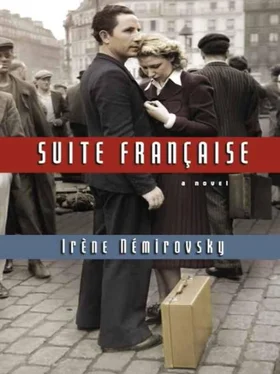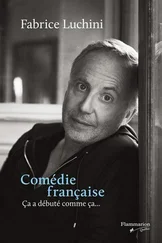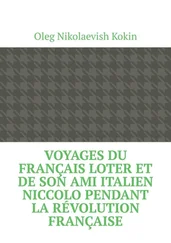Léon, whom Irène adored and admired, was always busy with his work and most of the time was away, or betting large sums of money at the casino. A lonely, solitary child, entrusted to the care of her governess, Irène took refuge in books, and fought off despair by developing a ferocious hatred of her mother. This violent and unnatural relationship between mother and daughter would be at the heart of many of her novels, as would her disdain for her mother's wealthy Jewish milieu.
In Russia the Némirovskys led a life of luxury. Every summer they would leave the Ukraine for the Crimean coast, Biarritz, Saint-Jean-de-Luz, Hendaye or the French Riviera. Irène's mother would take up residence in a villa, while Irène and her governess were sent to lodge with a family. At fourteen, after the death of her French teacher, Irène began writing. Settled on the sofa, a notebook on her lap, she developed a technique inspired by Ivan Turgenev. As well as the narrative itself, she would write down all the ideas the story inspired in her, without any revision or crossing out. She filled notebook upon notebook with thoughts about her characters, even the minor ones, describing their appearance, their education, their childhood, all the stages of their lives in chronological order. When each character had been detailed to this degree of precision, she would use two pencils, one red, the other blue, to underline the essential characteristics to be retained; sometimes only a few lines. She would then move quickly on to writing the novel, improving it, then editing the final version.
In 1917, the Némirovskys were still living in the large, beautiful house in St. Petersburg they had occupied since 1914. Némirovsky described the house in her autobiographical novel Le Vin de solitude: "The apartment… was built in such a way that from the entrance hall, you could see all the way back to the other rooms-a series of white and gold reception rooms that were visible through the large, open doors." For a number of Russian writers and poets, St. Petersburg is a mythical city; to Irène Némirovsky it was nothing more than a collection of dark, snow-covered streets, swept by the icy wind that rose from the disgusting, polluted canals of the Neva. When the October Revolution broke out, Léon Némirovsky thought it expedient to move his family to Moscow since he frequently went there on business and had sub-let an apartment from an officer of the Imperial Guard who had been assigned to the Russian embassy in London. His plan proved misguided. Moscow was where the more violent fighting took place and the family were trapped in the apartment for five days, their only food a bag of potatoes, some chocolate and sardines. Wedged in between other apartment blocks and surrounded by a courtyard, the house was hidden from the street. While battles raged outside, Irène explored the officer's library. There she discovered Huysmans, de Maupassant, Plato and Oscar Wilde ( The Portrait of Dorian Gray was her favourite book). When the street was deserted she would quietly go down to pick up the empty cartridges.
During a lull in the fighting, the Némirovskys went back to St. Petersburg, but the Bolsheviks had put a price on Léon's head and he was forced into hiding. In December 1917, taking advantage of the fact that the borders had not yet been closed, Léon Némirovsky made arrangements for his family to travel to Finland, disguised as peasants. Irène spent a year in a little hamlet consisting of three wooden houses in the middle of a snowfield. She still hoped to return to Russia and the wait seemed long. While they were there, her father returned to Russia several times in disguise to try and rescue their belongings. Yet despite the uncertainty and lack of comfort, Némirovsky experienced for the first time a period of serenity and peace. She was absorbed by her writing, composing prose poems inspired by Oscar Wilde.
With the situation in Russia deteriorating and the Bolsheviks drawing dangerously nearer to them, the Némirovskys moved on to Sweden, finally reaching Stockholm after a long journey. They spent three months in the Swedish capital, where Irène would always remember the mauve lilacs growing in the courtyards and gardens. Then, in early 1919, the family took a small cargo boat for France, sailing for ten days through a terrible storm, which inspired the dramatic final scene in David Golder. Safe in Paris, Léon Némirovsky took over as director of a branch of his bank and so managed to rebuild his fortune.
Irène had always loved France and, in Paris, her life changed utterly. She enrolled at the Sorbonne, where she graduated with a distinction in literature, and began sending stories to magazines. In 1927 she published a novella called L'Enfant génial, about a young Jewish boy from the slums of Odessa who seduces an aristocrat with his poetry.
The Némirovskys were soon assimilated into French society and led the glamorous life of the wealthy upper-middle class: fashionable soirées, champagne dinners, balls, luxurious holidays. Irène adored dancing. She dashed between parties, living, as she herself admitted, "the high life." Sometimes she gambled at the casino. On 2 January 1924 she wrote to a friend, "I have had the wildest week: one ball after another, and I'm still a bit heady and finding it difficult to get back into the routine of work…" Another time she wrote from Nice, "I'm behaving like a madwoman, it's shameful. I dance all night long. Every evening there are very chic entertainments in different hotels, and as my lucky star has blessed me with a few handsome young men, I'm enjoying myself very much indeed." A further letter, written just after a return from Nice, reads: "I haven't behaved very well… for a change… The evening before I left, there was a grand ball at our hotel, the Negresco. I danced like a mad thing until 2 a.m. and went outside in the freezing cold to drink champagne and flirt." A few days later she wrote: "Choura came to see me and lectured me for two hours: it seems that I flirt too much, that it's bad to upset boys like that… I broke off with Henry, you know, and he came to see me the other day looking pale, wide-eyed and evil, with a revolver in his pocket!"
In the whirlwind of one of these parties she met Mikhaïl-Michel Epstein-"a small dark-haired man with a very swarthy complexion," who wasted no time in courting her. He had a degree in Physical and Electronic Engineering from the University of St. Petersburg, and worked as a senior banking executive at the Banque des Pays du Nord, Rue Gaillon. She liked him, flirted and, in 1926, they were married. They moved to 10 avenue Constant-Coquelin, a beautiful apartment on the Left Bank, whose windows looked out over the large courtyard of a convent. In 1929 Irène gave birth to Denise (Fanny sent a teddy bear). By the time her second daughter, Elisabeth, was born in 1937, David Golder had been turned into a film, and she had published nine novels. She and Michel moved in high circles and took holidays in fashionable spa towns for Irène's asthma.
In spite of her fame, and though clearly very attached to her new country, Irène still didn't have French citizenship. In 1939 Irène decided that she and her children should convert to Catholicism. This decision should be seen in the context of the obsessive fear of war in 1939, and the previous decade of violent anti-Semitism during which Jews had been portrayed as evil invaders and power-hungry warmongers-a race of bourgeois merchants and revolutionaries. She and her family were baptised early in the morning of 2 February 1939 in the Chapel of Sainte-Marie in Paris, by a family friend, Prince Ghika, a Romanian bishop.
When war broke out in September, Irène and Michel took their two small daughters, Denise and Elisabeth, to the safety of Issy-l'Evêque, in Saône-et-Loire, the village where their nanny, Cécile Michaud, came from. There, they were left in the care of Cécile's mother, Madam Mitaine.
Читать дальше

![Константин Бальмонт - Константин Бальмонт и поэзия французского языка/Konstantin Balmont et la poésie de langue française [билингва ru-fr]](/books/60875/konstantin-balmont-konstantin-balmont-i-poeziya-francuzskogo-yazyka-konstantin-balmont-et-thumb.webp)










